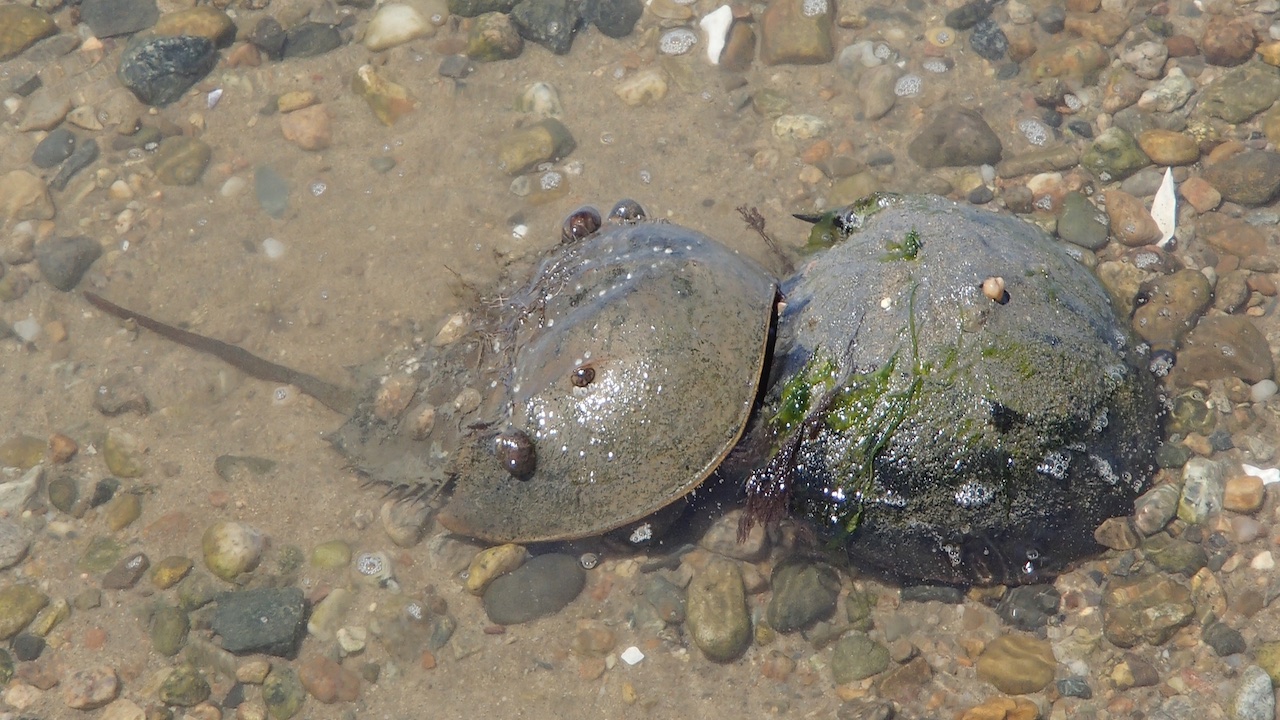
The horseshoe crab was plentiful when I was a child at Priscilla Beach in the fifties. There are still some when my children were young, late sixties, early seventies. I don’t remember when I last saw one.—Mary Mullaney
Massachusetts Horseshoe Crab Advocates Have a Plan!
The Mission of the Massachusetts Horseshoe Crab Collaborative is to restore horseshoe crabs in Massachusetts to numbers closer to their historical levels allowing them to fulfill their ecological role in the marine ecosystem and support a statistically significant increase in the shorebirds and in the many marine species dependent upon them, and thereby, renew the Web of Life at the edge of the sea. Review the plan. Join the Collaborative!
View the Horseshoe Crab Collaborative Strategic Plan here.
Contact the Coordinator Sharl Heller at [email protected] for more information and to join the Collaborative.
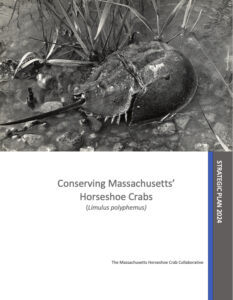
Current Action Item
Massachusetts needs to do more to protect horseshoe crabs.
The time for us to take action is now.
We are at a crucial juncture in the conservation efforts for our most fascinating marine creature – the horseshoe crab. These ancient creatures have roamed our oceans for millions of years, playing a vital role in our coastal ecosystem, but coastal development and harvesting for bait and for blood extraction has led to a catastrophic drop in their numbers to the point where they are no longer able to fulfill their ecological role —and we should be concerned!
That is why we are asking you to speak up in support of our petition to add horseshoe crabs to the Massachusetts Endangered Species Act (MESA) list as a "Special Concern" species.
On April 9, 2024, the Division of Fisheries and Wildlife Board held a public hearing on proposed changes to the MESA list. There's still time for you to speak up to help protect horseshoe crabs.
Written comments will be accepted until Tuesday, April 23, 2024, at 5:00 p.m.
Submit Comments
Send you comments to: Chair, Fisheries and Wildlife Board c/o Director of MassWildlife Mass. Division of Fisheries and Wildlife 1 Rabbit Hill Road, Westborough, MA 01581.
Comments by e-mail may be sent to [email protected], to the attention of the Fisheries and Wildlife Board.
This is a significant opportunity for us to voice our support for greater protection of these remarkable animals.
Why list horseshoe crabs as a "Special Concern" species?
- Declining Trends: Species experiencing significant declines in population numbers, reproductive success, or habitat quality may be considered for listing.
- Threats from Human Activities: Species that are threatened by human activities such as habitat destruction, pollution, climate change, invasive species, or direct exploitation may be considered for listing.
- Prioritization: State listing identifies species within Massachusetts that are at risk of declining populations. By identifying horseshoe crabs as a "special concern" species, the state can prioritize conservation efforts and allocate resources to restore their populations.
- Conservation: Listing horseshoe crabs identifies them as a species at risk within a specific geographical area, allowing for targeted conservation efforts to protect and restore their habitat.
- Public Awareness: State listing can raise public awareness about the importance of horseshoe crabs to biodiversity and encourage conservation efforts to ensure their survival for future generations.
- Funding: Species listed as "special concern" may be eligible for conservation funding for additional research that can inform management efforts to support their recovery.
Why the new fishery regulations are not enough
The Marine Fisheries Advisory Commission voted to close the harvest of horseshoe crabs during part of their spawning period (April 15 - June 7), yet bait harvesters are still permitted to kill 140,000 horseshoe crabs again this year and the two biomedical companies on Cape Cod will bleed 200,000 more, even though the long-term effects of bleeding are unknown.
The Commonwealth's horseshoe crab eradication program wiped out millions of horseshoe crabs in the 1950s. Since then, millions more have been killed for bait. Decades of degradation of horseshoe crab spawning habitat due to development and beach armament continues —and now sea level rise due to climate change threatens much of the remaining spawning habitat. The fishing regulations do not include a comprehensive management program for rebuilding horseshoe crab populations. State listing can open the door to greater funding opportunities for restoration programs, education, and research.
Spread the Word: Share this message with your friends, family, and colleagues to raise awareness about the importance of protecting horseshoe crabs. Together, we can make a difference in the conservation of these remarkable creatures. Let's ensure a bright and sustainable future for horseshoe crabs in Massachusetts.
SEMPBA volunteers understand that horseshoe crabs used to spawn in Massachusetts in numbers so great that the state paid bounties to rid beaches of them. Today, you feel fortunate even to see just one. Twenty years of management has failed to restore horseshoe crab populations—and maintaining just enough horseshoe crabs for fishermen and biomedical labs falls short of the state's mandate to restore horseshoe crab population in numbers that can support shorebirds and the other species that depend on them for food.
SEMPBA submitted a proposal to state list the American horseshoe crab (Limulus polyphemus) as a Special Concern Species to the Massachusetts Division of Fisheries and Wildlife Natural Heritage and Endangered Species Program (NHESP).
Letters in Support of State Listing Horseshoe Crabs in Massachusetts
The NHESP Advisory Committee Declines to State List Horseshoe Crabs
At the October 12, 2023 meeting, the Massachusetts Natural Heritage and Endangered Speceis Program Advisory Committee declined to add horseshoe crabs to the Massachusetts Endangered Species Act (MESA) List. This decision was based on the external reviews listed here:
David Smith, Emeritus Scientist, USGS (against)
Kathryn Tuxbury, MS, DVM (pro)
John Sweka, Ph.D., U.S. Fish & Wildlife Service (aganist)
__________________
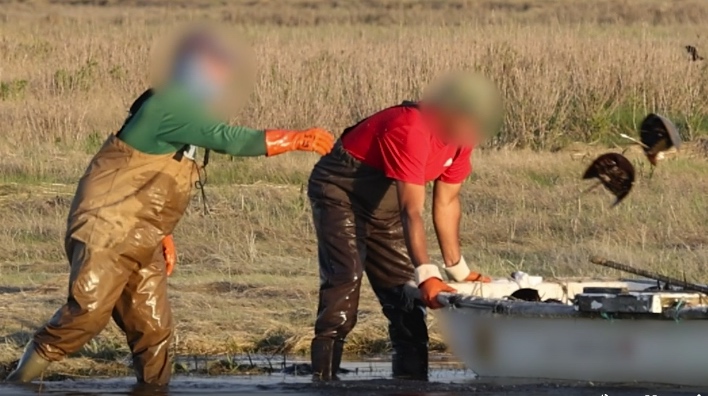
Why we need a plan. Horseshoe Crab Capture in Duxbury, video by Raymond MacDonald. View Video.
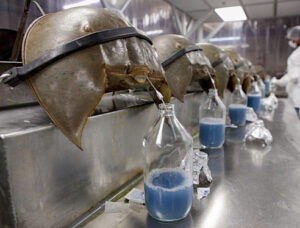
Horseshoe Crabs and Human Health
Horseshoe Crabs evolved over 350 million years, millions of years before dinosaurs existed. Today, the Atlantic horseshoe crab (Limulus polyphemus) is classified as vulnerable to extinction by the IUCN. The decrease in horseshoe crabs affects migrating shorebird species, such as the Red Knot, that depend on horseshoe crab eggs for food during migration.
Horseshoe Crabs are also widely used in the biomedical industry because their blue blood contains a protein called Limulus Amebocyte Lysate (LAL), which is used by pharmaceutical companies and medical device manufacturers to test their products for the presence of bacteria.
Recently, the U.S. Pharmacopeia drafted regulations that, if approved, will allow pharmaceutical companies to develop an alternative to horseshoe crab blood.
The proposal standards from the United States Pharmacopeia are a first step toward easing the transition for pharmaceutical companies away from products that are derived from horseshoe crab blood.
More information
Expert Committee Proposes Chapter for Endotoxin Testing Using Non-Animal Derived Reagents, August, 22, 2023. The proposed addition of Chapter <86> to the US Pharmacopeia is in keeping with USP’s commitment to expanding the use of animal-free methods and materials. The official open comment period will run from Nov. 1, 2023, through Jan. 31, 2024.
I am BIO Podcast | BIO
Podcast with Eli Lilly and Roche-Genentech discussing the importance and advantages of using synthetic alternatives to assays derived from horseshoe crab blood.
The Role of Horseshoe Crabs in the Biomedical Industry and Recent Trends Impacting Species Sustainability, Frontiers in Marine Science. June 2018.
Horseshoe Crabs as Sustainers of Biodiversity
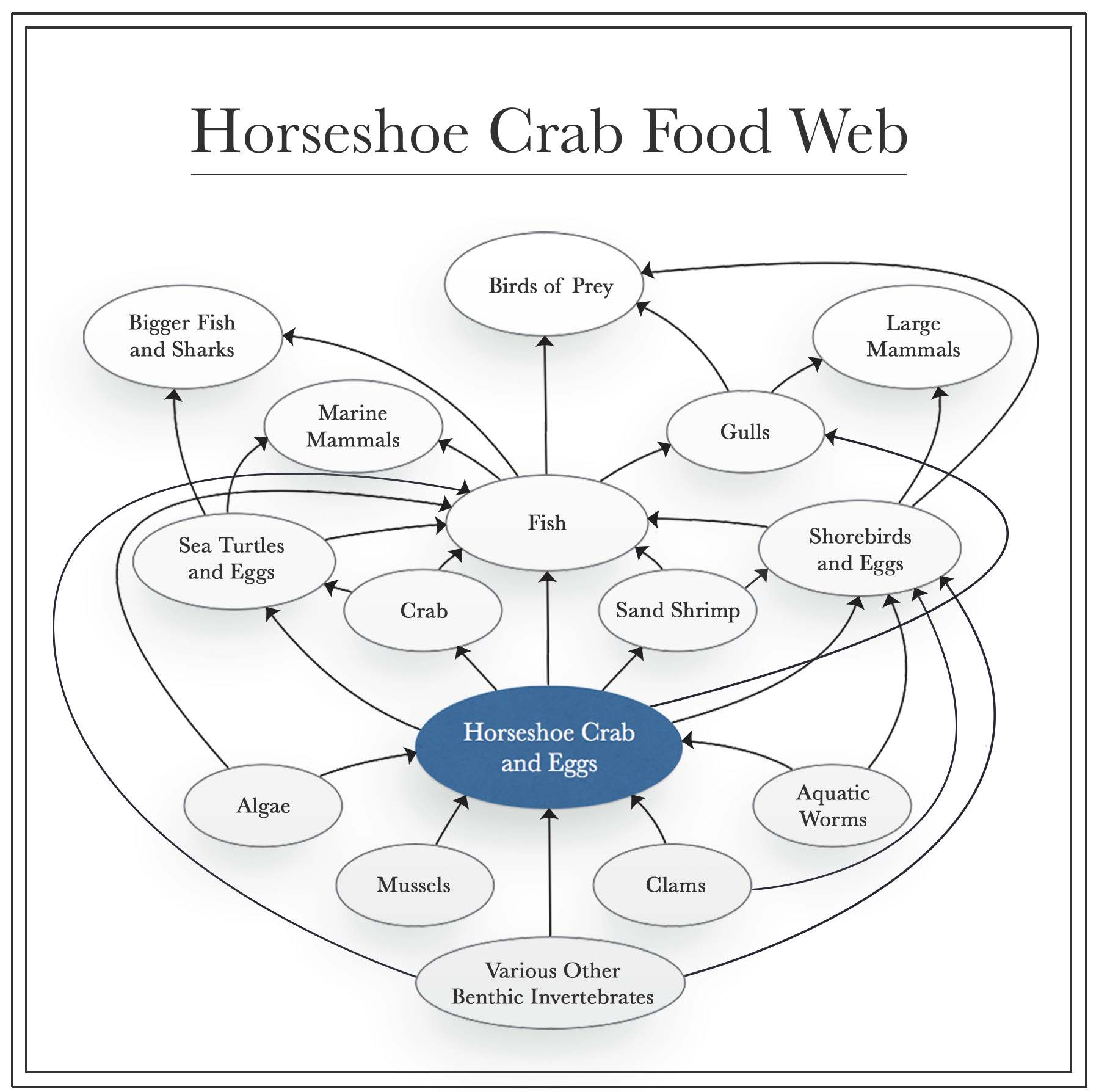
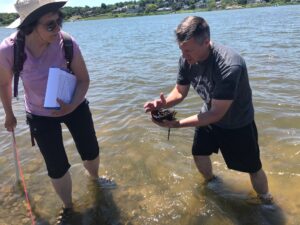
Who We Are
SEMPBA volunteers want to better understand horseshoe crabs; their critical role in human health and in the global ecosystem—particularly in their evolutionary ability to sustain migrating shorebirds on long intercontinental migrations. That is why SEMPBA volunteers participate in the Massachusetts Department of Marine Fisheries Spawning Horseshoe Crab Survey program, providing data to the Commonwealth help set limits on their "take" and why we created a Facebook page to help focus advocacy efforts where they may do the most to ensure that these ancient creatures rebound and flourish as they have for millennia.
Keep current and find more information on the SEMPBA Horseshoe Crab Advocates Facebook Page.
We invite you to join in this effort with us. visit our website: www.horseshoecrabs.org.
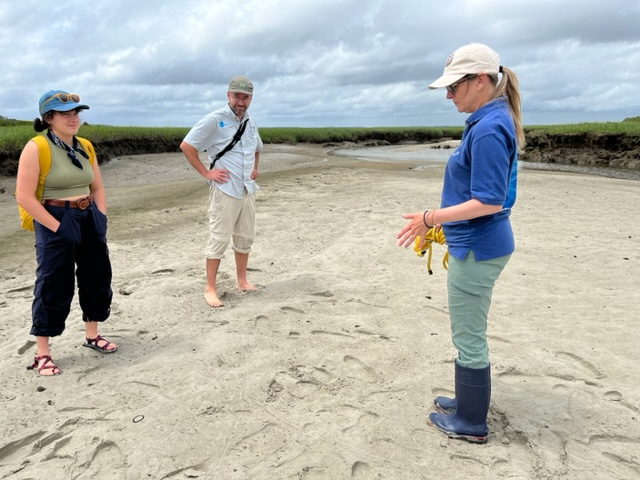
Horseshoe Crab Survey Protocol: A Guide to the One-Egg Test Transect-Based Horseshoe Crab Surface Egg Presence/Absence Sampling
Joe Smith and Susan Linder, Wildlife Restoration Partnerships, June 2023
This protocol was developed to provide a simplified methodology for measuring horseshoe crab surface egg abundance. While other surface egg studies include counting the actual number of surface eggs within each sample, in this study, the data being recorded is solely the presence or absence of surface eggs.
Training available. Contact Sharl at [email protected] for more information.
The Horseshoe Crab: Against All Odds
Southeastern Massachusetts Pine Barrens Alliance (SEMPBA) invites artists to participate in the art exhibition "The Horseshoe Crab: Against All Odds." The exhibition will feature works in a variety of media including fine art, photography, printmaking, glass, ceramics, textile, sculpture, jewelry, etc. Artists are encouraged to submit works that explore the beauty of these ancient creatures, their ecological importance, and the threats they face.
Selected works will be exhibited at the Plymouth Center for the Arts, 11 North Street, Plymouth, Massachusetts, June 12 through July 7, 2024.
Images may be included in an Online art exhibition as well, with the artist's permission.
Deadline for submission is February 15, through April 15, 2024. More information at the Against All Odds website.
Replay Horseshoe Crab Virtual Discussions
The Economic and Ecological Role of the Horseshoe Crab and How You Can Help with its Conservation; a discussion with Dr. Jennifer Mattei, Professor of Biology, Sacred Heart University, and horseshoe crab advocates in Massachusetts. April 28, 2022.View the video recording here.
We are sad to note that Dr. Mattei passed away on December 9, 2022. Sacred Heart University has set up a scholarship fund in her honor. Donations to The Jennifer H. Mattei Scholarship for Undergraduate Research accepted here.
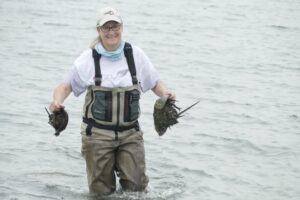
450 Million Years and Vulnerable—Horseshoe Crabs in Massachusetts; A Zoom video discussion from three perspectives with three experts whose lives revolve around Horseshoe Crabs: Brett Hoffmeister, LAL Manufacturing Manager, Associates of Cape Cod; Derek Perry, Invertebrate Fisheries Project, Massachusetts Division of Marine Fisheries; and Deborah Cramer, Author of The Narrow Edge: A Tiny Bird, an Ancient Crab, and an Epic Journey (Yale University Press). February 5, 2022. View the video recording here.


